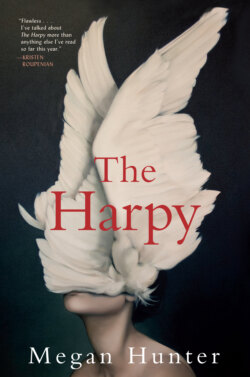Читать книгу The Harpy - Megan Hunter - Страница 13
На сайте Литреса книга снята с продажи.
Оглавление4
I imagined how a woman in a film would react, on receiving this news. She would shake: I held out my hand, to see if it was shaking. But my hands have always had a slight tremor. I watched my fingers, their individual movements, separate creatures twitching in the kitchen lights.
The TV continued in the next room, pulsing on regardless. When I was a child I was disappointed to realize that television would not keep me safe: I had thought of it as an intelligent presence, able to sense danger. But then I saw a police reconstruction of a murder, and the woman was dead on her sofa, the TV talking over her head.
Please can I have a drink, Mummy! We had taught the children to say please, but had not taught them to come into the kitchen and pour water from a plastic jug set at a low height. We had not done this, and yet we blamed them, rolled our eyes at each other whenever they called out to us, their servants. When I was alone it was easier to be a servant, to lose myself in this particular pattern of movement, from cupboard to sink, sink to hallway to their thirsty faces. People complain that women lose themselves to motherhood, but aren’t so many of the things we do an attempt to lose ourselves? I never minded the practical aspects much: the fetching and carrying, the work of the hands.
I started the dinner. I could only make a few dishes, simple things mostly. I had a whole shelf of recipe books, like most people do, and I cooked from them, occasionally, in a new-year burst of good intentions, or a sudden inclination following a dream. But these recipes never stuck, however simple. This is what stuck: a chicken breast, sliced into sections, each part lowered into a bowl of seasoned flour. Even seasoning the flour felt fancy, the faith that salt and pepper would somehow cling to the white powder and make some difference to the taste of the chicken. Cooking always seemed mysterious to me, the art of the unseen.
As I sliced the chicken, I noticed that it had changed, the fibres of the meat altered, more granular, the skinless surface almost opalescent. I am a woman whose husband is having an affair, I said to myself in my head, as though these words would make some difference to reality. Then I said them out loud, wanting to taste the phrase under my tongue, to pass its particular rhythms through my lips. I said her name.
Vanessa. The first times I saw her: laughing at our Christmas party. A soft handshake at a work do, then later: straight backed, clapping. A neat suit jacket, her hair tucked behind her ears. Where did she buy those jackets? I imagined that she had a personal shopper, someone who presented her with racks of almost identical jackets, described their subtle differences of tailoring. Vanessa Holmes. A raised eyebrow, plucked to a wisp, the tail of a tiny animal.
I noticed that I felt sick; I noticed this as you would notice that a book has fallen from a shelf: impartially, at a distance. When I was offered pethidine in labour with Paddy, they said it wouldn’t take away the pain, but it would make me care about it less. You’ll see it there, said the midwife, but it won’t matter to you. It appealed to me, this separate pain, but there was no time to take the drugs, as suddenly Paddy was coming, and the choice was gone.
After the chicken was cut I squeezed an entire lemon over the top, like my mother taught me to do. My mother didn’t like cooking, but she knew certain things. She knew about clamping your fist down on the thick yellow skin, digging your nails in, squeezing tight. As I did it I noticed – apart again, from a small space away – how it made me feel, as though a cool wind was blowing through my chest. I squeezed harder, the juice falling into the sizzling pan, my teeth coming together, my jaw clenched. I kept doing it, feeling my face contorting into an ugly shape. When I had finished – when there was not one drop of lemon juice left in that fruit – I turned around to throw the skin away. Ted was there in the doorway watching me, his mouth hanging half open.
~
There is a trail of anger flowing through my bloodline, from my great-grandmother, to my grandmother, to my mother, to me. Perhaps it goes even further back too, to my great-great-grandmother, who had twelve children, three of whom died.
One of them, so the story goes, was left out in a pram until his face blistered over in the sun. This is a story I have known since childhood, but when I told it to my mother, she said that I had made it up. I am left with the mystery of this woman of many children; was she too busy to notice the baby in the pram? Did she forget?
~
